The Christian Themes In 2016's Biggest Films: Part 2
If you look for him, Jesus is hiding all over the place in modern cinema. In fact, a trip to the local multiplex can often feel like a theological version of 'Where's Wally?'. Sometimes you find him in the most unlikely places (like last year's Mad Max: Fury Road), and sometimes you can't miss him (thanks for the subtle approach, God's Not Dead 2); either way our culture's biggest stories seem to continually chime with the Eternal Story. Following on from part one, here's six more months of the year's biggest movies and just a few of the places where God or theology showed up, unexpectedly or otherwise.
July
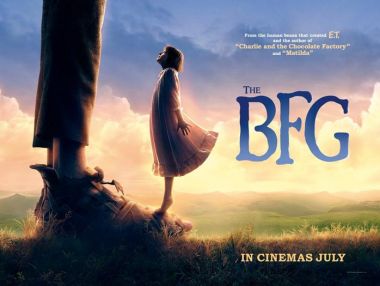
They made us wait a long, long time for a sequel to Finding Nemo, but when it finally arrived, Finding Dory was a delight. Yet as Krish Kandiah wrote on this site, while the film does a great job of dealing positively with disability, it contained plenty to unsettle children who are or were in the care system. Interestingly it wasn't the only children's film that month to take that risk; The BFG's central child character is also abducted from a London orphanage. The latter film continued 2016's trend for live-action remakes of beloved animations and featured a brilliant motion-capture performance from Mark Rylance as the giant of the title. The Secret Life of Pets was suitably fluffy fun but it lacked the depth and intelligence of the year's earlier sentient animal movies, as did the 17th (or something) Ice Age movie, Ice Age: Collision Course (it was no good, but that won't stop them). They were joined in the cinematic summer by perhaps the most Marmite movie of the year, Paul Feig's all-female remake of Ghostbusters, which for my money was a fun caper with a strong cast and helped to expose the latent gender prejudices of some of the movie-going public. None of these films really had much to say about God or theology, so it was a good job that Star Trek: Beyond addressed more spiritual themes of hope and the need for a saviour, albeit in the context of an apparently godless universe.
August
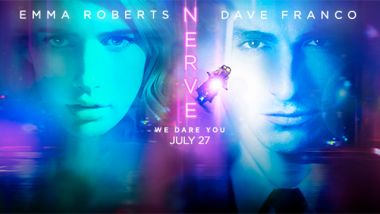
After Ghostbuster's all-girl cast caused uproar the previous month, the mixed ethnicity anti-heroes of Suicide Squad drew similar fire in August. And again, while reviews and Internet chatter poured scorn on DC's latest attempt at challenging Marvel's screen superiority, the movie itself turned out to be perfectly fine. It also provided a really interesting exploration of the idea of redemptive violence and the idea that some kinds of evil are worse or better than others.
While it didn't make a huge splash, I'll warn you now that apparently flimsy teen movie Nerve is going to make an appearance in my top 10 films of the year. With plenty of inventive camerawork, a strong narrative thread and a fascinating illumination of digital youth culture, for me it was the most under-rated movie of 2016, although it was closely challenged by superior western Hell or High Water. From a Christian perspective, the Mark Burnett/Roma Downey megabucks remake of Ben-Hur should have been the highlight of the year but it flopped horribly, failing to perform anywhere near as well as projected thanks to sniffy reviews and the fact that it wasn't actually any good. It was better than David Brent: Life on the Road, however, the Ricky Gervais vanity project which was definitely 2016's most disappointing film. Christians 1, Atheists 0, but only just.
September
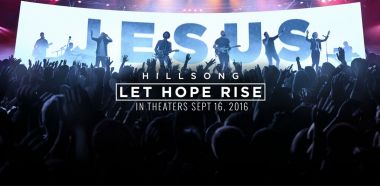
A sequel hasn't been excitedly anticipated and dreaded in such equal measure since parents realised they were making another Moshi Monsters movie; Bridget Jones' Baby wasn't a critical hit, but that didn't stop fans flocking to cinemas all month long. Which was a shame, because it meant that fewer people went to see Hillsong: Let Hope Rise, the movie version of everyone's favourite megachurch, which released the same day. As the month progressed, things started to heat up a bit; The Magnificent Seven remake way exceeded expectations but gave an ugly insight into the American cultural belief that guns can save the world, while Mark Wahlberg's Deepwater Horizon was a similarly above-average disaster movie which took a high view of Christian faith. The scene near the end where the survivors of the film's stricken oil-rig kneel in prayer is one of the most spiritually-profound and God-affirming in recent history.
October
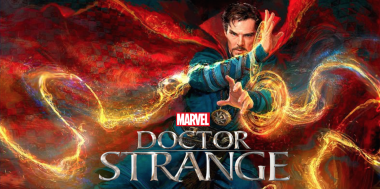
If ever there was a film perfectly reviewed by its own title, it was Jack Reacher: Never Go Back. Tom Cruise needs to knock it off now and start playing interesting characters again or people might start to write him off as a bit of a religious weirdo. It wasn't the worst big-budget movie of the month, however; someone inexplicably green-lit yet another Tom Hanks / Dan Brown movie, Inferno. In better news, Ben Affleck vehicle The Accountant was very nearly a superb movie, which had one twist too many and became only quite good. The tale of an autistic man who harnesses his difficulties and turns them into super powers was too silly in places to be truly inspirational but it did at least provide a subversive view of 'disability.' And while the film itself was fairly derivative, Emily Blunt lit up The Girl on the Train and familiarised us all with 'gaslighting', a cousin of the sort of spiritual abuse that is unfortunately too common in the Church. The best film of the month by far was Marvel's Doctor Strange, the Benedict Cumberbatch superhero origin story which was packed with theological themes and concerned itself with a world beyond the physical. It wasn't specifically Christ-affirming, but it certainly opened the door to the idea of being able to access a power way beyond our own, and doing so through faith. It also wins top marks for having some of the most innovative action sequences of this or any other year.
November

Another thoughtful sci-fi/fantasy film was arguably November's strongest movie, Denis Villeneuve's Arrival. It pitted Amy Adams' gifted translator against trigger-happy generals over the question of what to do about a series of huge alien spaceships which suddenly begin hovering above the earth. This was no Independence Day, however; instead, like the best sci-fi, it was really about something far deeper and profound, and posed a heartbreaking (and very theological) question: if you knew something beautiful would end in tragedy, would you still want to see it unfold?
Fantastic Beasts and Where To Find Them was a long-awaited new foray into the Harry Potter universe, and included some great monsters and a raft of interesting new characters; ultimately though it failed to really live up to the unenviable hype. Not so with Moana, Disney's Pacific Island adventure, which featured a fantastically three-dimensional female hero and the greatest ever performance by Dwayne 'The Rock' Johnson (not a huge achievement). The film might be rooted in Polynesian myth, but ideas of calling, purpose and trusting in a higher power are equally resonant with a Christian worldview. The Edge of Seventeen, a lower-budget coming of age comedy, provided a fascinating insight into the world of teenagers, and is essential viewing for any Christian who wants to engage seriously with them and their culture. It's a bit rude though.
December
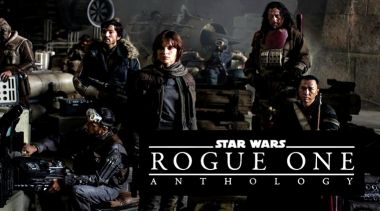
Just as in 2015, the final month of the year was dominated by the release of one film: Rogue One: A Star Wars Story. And just as with last year's The Force Awakens, the movie delivered on expectations with a thrilling mix of dot-joining nostalgia and the breaking of brave new ground. In particular, it does a fine job of exploring what it means to live – and die – for a cause that is worthy of the ultimate sacrifice. From the sublime to the ridiculous, Office Christmas Party was the sort of film that you can probably accurately imagine from the title, and appeared to be written by two 15-year-old boys. And as the year came to an end, Collateral Beauty and Monster Trucks underwhelmed early reviewers, but promising sci-fi epic Passengers – which had a fantastic setup involving Jennifer Lawrence and Chris Pratt waking up too early on a voyage into deep space – turned out to be a morally corrupt forced consent story which was apparently unaware of its own creepiness. Not a great way to end the year, so many of us went to see Rogue One again in order to finish on a high.
And my films of the year
Before you get angry with this random man on the Internet, remember that this is an entirely subjective list, based entirely on the films which I've actually seen in 2016 (which rules out Sully, Lion and Hunt for the Wilderpeople, both of which were highly rated among viewers). And I still haven't forgiven The Big Short for being so unpleasant.
10. Nerve – It might be a wild card but it's a visually-arresting dip into youth culture, and its mildly horrific central idea is worryingly plausible.
9. Midnight Special – A perfect example of how imagination trumps budget every time; stays with you for days afterwards.
8. Zootropolis / Zootopia – Really funny, really smart and with a really important message. My kids love it, and I love it just as much.
7. Arrival – A wonderfully surprising sci-fi about real people and big ideas, masterfully shot.
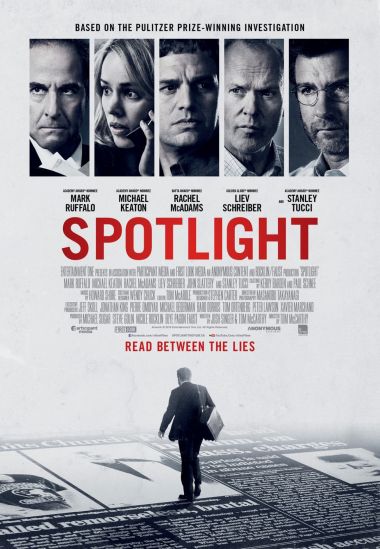
6. Doctor Strange – Benedict Cumberbatch proves a worthy addition to the MCU in an endlessly-inventive fantasy tale.
5. Rogue One: A Star Wars Story – The first Star Wars Anthology film is dark, thoughtful and regularly breathtaking.
4. Captain America: Civil War – Far from tailing off, Marvel movies are getting better and better, this one juggling a remarkable number of well-drawn characters.
3. The Revenant – Leonardo Di Caprio deserved everything he got for this phenomenal tale of endurance and revenge.
2. Sing Street – Nothing made me laugh or cry as much in 2016; a truly wonderful film.
1. Spotlight – Rightly named Best Picture at the Oscars, this tale of the relentless pursuit of justice is a cinematic masterpiece.
Martin Saunders is a Contributing Editor for Christian Today and the Deputy CEO of Youthscape. Follow him on Twitter @martinsaunders.











